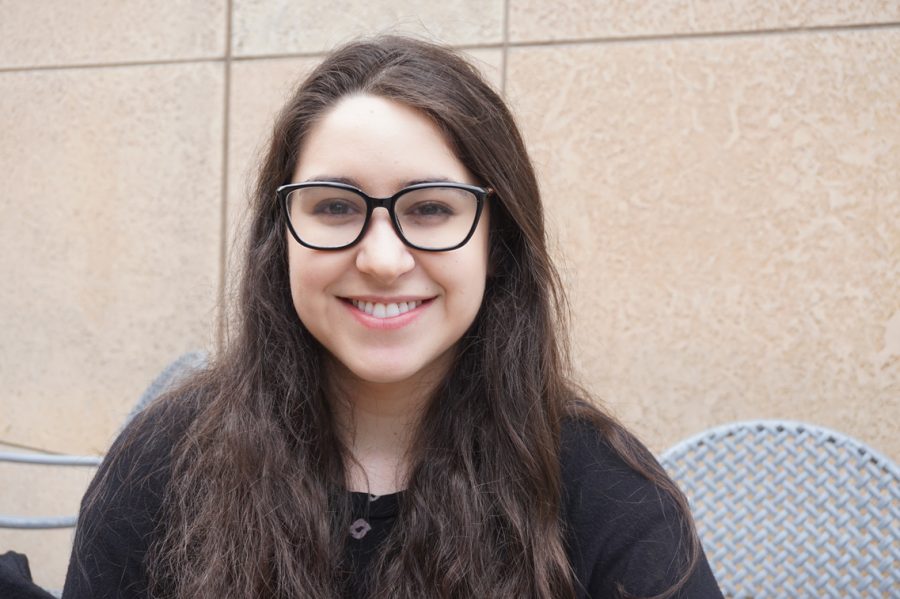Q&A: Gallatin Student Seeks to Protect Peers Through Campaign
NYU Gallatin senior, Madeline Dolgin, has been awarded the Social Justice Award for her “I Am Your Protector” campaign.
April 29, 2016
Gallatin senior Madeline Dolgin was named the first recipient of NYU’s Center for Global Spiritual Life Social Justice Award in honor of her participation in social justice and multi-faith initiatives at NYU, such as her work with the “I am Your Protector” campaign. Dolgin is a member of the GSL’s Multi-faith Advisory Council, a leader of Syrian Refugee Awareness Week, a faith-zone trainer and a former intern at the Bronfman Center.
Dolgin spoke to WSN about how her religious background as a Jewish student has informed her work in social justice at the university.
WSN: Can you describe your work on NYU’s Center for Global Spiritual Life’s Multi-faith Advisory Council?
Madeline Dolgin: The first idea was for the 13 of us to be able to have our own dialogue, learn about each other and learn about different faiths through having conversations with somebody who experiences it. It’s so much different than learning about these faiths in a textbook. The second component was to bring it out to the wider community and to start to have these conversations.
WSN: How did you become interested in social justice and religion?
MD: I’m Jewish and grew up reform Jewish. In high school, there was a large Christian community and so I was always somewhat separate being Jewish, and then my freshman year at NYU, I ended up going to the Bronfman Center for Jewish Student Life and getting involved there and really finding a community that I related to. But then sophomore year, I lived with a girl who is Muslim. We were both interning at our respective faith centers and we’d ask each other questions about traditions. It made me realize the gaps in my own knowledge. When I found that being Jewish could connect me to someone who was Muslim, especially in light of Israel/Palestine and anti semitism/Islamophobia, that relationship challenged the way that people think about those situations and it made me think more about it and how we can work across our differences to achieve something.
WSN: Why did you feel these were important issues at NYU, and how did you find ways to become involved in the interaction between social justice and religion at the university?
MD: The relationship that we have in place between those two communities added to my experience because I was able to go to the Muslim prayer on Friday with my roommate, try on a hijab and try to understand what that means by experiencing it. It’s different when you have that personal experience. She also came to Shabbat with me, went to a service and we even studied with a Rabbi what Judaism says about the afterlife.
WSN: What is the “I Am Your Protector” campaign and how did you become involved?
MD: “I Am Your Protector” runs like a non-profit model except everyone donates their funds and their work pro bono. There’s not a set group of staff; it’s a large community of activists all over the world. Our mission is to challenge these stereotypes in the media that lump people into one monolithic group as a way of attacking them.
WSN: How has your religious background as a Jewish student played a role in your work with the “I Am Your Protector” campaign, an open organization for people of all religious faiths?
MD: There were these hints of anti-semitism that I did not understand and had no way of talking about when I was a child. At NYU, in finding both this really incredible, strong Jewish community where there were so many more opportunities to learn and to really understand the impact of Judaism in the world, I ended up finding campus to be similar in more ways than one to the way the Christian community was [back home].
And then living with the Muslim student and realizing that my faith doesn’t have to be something that is only within this group and that I can use it as a way of understanding somebody different made me more interested in faith and the activism side of it when realizing a Muslim and a Jew can challenge some of these really hateful sentiments I was hearing in the news.
WSN: Do you plan on continuing your work in social justice after you graduate?
MD: I just went through five interviews to work with the Jewish community at Arizona State University, and hope to be able to bring back this experience that I had here on campus through working with students of my own community and students who grew up with a similar story as mine. I’m really inspired by what happens at college. I think this is the age where you can have these kinds of conversations and I see a lot of promise and potential for really creating peace that comes out of these interfaith experiences that I have had. I want to continue to work in the college environment with activism, but maybe eventually go to graduate school and do politics and law and see how to translate that into policy.
Email Greta Chevance at [email protected].
























































































































































